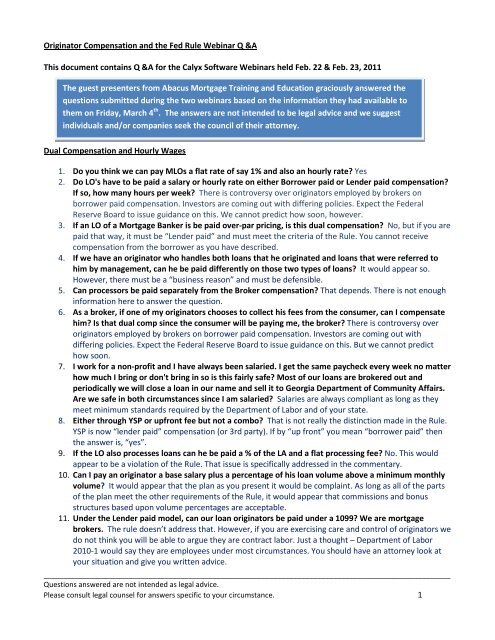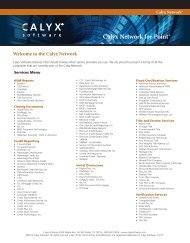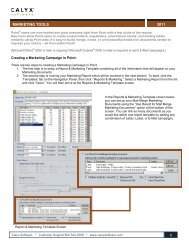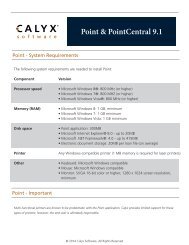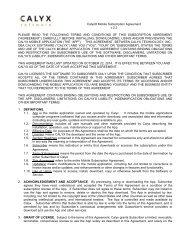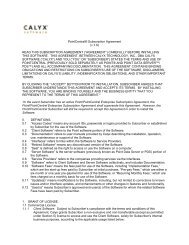Originator Compensation and the Fed Rule ... - Calyx Software
Originator Compensation and the Fed Rule ... - Calyx Software
Originator Compensation and the Fed Rule ... - Calyx Software
Create successful ePaper yourself
Turn your PDF publications into a flip-book with our unique Google optimized e-Paper software.
<strong>Originator</strong> <strong>Compensation</strong> <strong>and</strong> <strong>the</strong> <strong>Fed</strong> <strong>Rule</strong> Webinar Q &A<br />
This document contains Q &A for <strong>the</strong> <strong>Calyx</strong> <strong>Software</strong> Webinars held Feb. 22 & Feb. 23, 2011<br />
The guest presenters from Abacus Mortgage Training <strong>and</strong> Education graciously answered <strong>the</strong><br />
questions submitted during <strong>the</strong> two webinars based on <strong>the</strong> information <strong>the</strong>y had available to<br />
<strong>the</strong>m on Friday, March 4 th . The answers are not intended to be legal advice <strong>and</strong> we suggest<br />
individuals <strong>and</strong>/or companies seek <strong>the</strong> council of <strong>the</strong>ir attorney.<br />
Dual <strong>Compensation</strong> <strong>and</strong> Hourly Wages<br />
1. Do you think we can pay MLOs a flat rate of say 1% <strong>and</strong> also an hourly rate? Yes<br />
2. Do LO's have to be paid a salary or hourly rate on ei<strong>the</strong>r Borrower paid or Lender paid compensation?<br />
If so, how many hours per week? There is controversy over originators employed by brokers on<br />
borrower paid compensation. Investors are coming out with differing policies. Expect <strong>the</strong> <strong>Fed</strong>eral<br />
Reserve Board to issue guidance on this. We cannot predict how soon, however.<br />
3. If an LO of a Mortgage Banker is be paid over-par pricing, is this dual compensation? No, but if you are<br />
paid that way, it must be “Lender paid” <strong>and</strong> must meet <strong>the</strong> criteria of <strong>the</strong> <strong>Rule</strong>. You cannot receive<br />
compensation from <strong>the</strong> borrower as you have described.<br />
4. If we have an originator who h<strong>and</strong>les both loans that he originated <strong>and</strong> loans that were referred to<br />
him by management, can he be paid differently on those two types of loans? It would appear so.<br />
However, <strong>the</strong>re must be a “business reason” <strong>and</strong> must be defensible.<br />
5. Can processors be paid separately from <strong>the</strong> Broker compensation? That depends. There is not enough<br />
information here to answer <strong>the</strong> question.<br />
6. As a broker, if one of my originators chooses to collect his fees from <strong>the</strong> consumer, can I compensate<br />
him? Is that dual comp since <strong>the</strong> consumer will be paying me, <strong>the</strong> broker? There is controversy over<br />
originators employed by brokers on borrower paid compensation. Investors are coming out with<br />
differing policies. Expect <strong>the</strong> <strong>Fed</strong>eral Reserve Board to issue guidance on this. But we cannot predict<br />
how soon.<br />
7. I work for a non-profit <strong>and</strong> I have always been salaried. I get <strong>the</strong> same paycheck every week no matter<br />
how much I bring or don't bring in so is this fairly safe? Most of our loans are brokered out <strong>and</strong><br />
periodically we will close a loan in our name <strong>and</strong> sell it to Georgia Department of Community Affairs.<br />
Are we safe in both circumstances since I am salaried? Salaries are always compliant as long as <strong>the</strong>y<br />
meet minimum st<strong>and</strong>ards required by <strong>the</strong> Department of Labor <strong>and</strong> of your state.<br />
8. Ei<strong>the</strong>r through YSP or upfront fee but not a combo? That is not really <strong>the</strong> distinction made in <strong>the</strong> <strong>Rule</strong>.<br />
YSP is now “lender paid” compensation (or 3rd party). If by “up front” you mean “borrower paid” <strong>the</strong>n<br />
<strong>the</strong> answer is, “yes”.<br />
9. If <strong>the</strong> LO also processes loans can he be paid a % of <strong>the</strong> LA <strong>and</strong> a flat processing fee? No. This would<br />
appear to be a violation of <strong>the</strong> <strong>Rule</strong>. That issue is specifically addressed in <strong>the</strong> commentary.<br />
10. Can I pay an originator a base salary plus a percentage of his loan volume above a minimum monthly<br />
volume? It would appear that <strong>the</strong> plan as you present it would be complaint. As long as all of <strong>the</strong> parts<br />
of <strong>the</strong> plan meet <strong>the</strong> o<strong>the</strong>r requirements of <strong>the</strong> <strong>Rule</strong>, it would appear that commissions <strong>and</strong> bonus<br />
structures based upon volume percentages are acceptable.<br />
11. Under <strong>the</strong> Lender paid model, can our loan originators be paid under a 1099? We are mortgage<br />
brokers. The rule doesn’t address that. However, if you are exercising care <strong>and</strong> control of originators we<br />
do not think you will be able to argue <strong>the</strong>y are contract labor. Just a thought – Department of Labor<br />
2010-1 would say <strong>the</strong>y are employees under most circumstances. You should have an attorney look at<br />
your situation <strong>and</strong> give you written advice.<br />
_____________________________________________________________________________________________________<br />
Questions answered are not intended as legal advice.<br />
Please consult legal counsel for answers specific to your circumstance. 1
<strong>Originator</strong> <strong>Compensation</strong> <strong>and</strong> <strong>the</strong> <strong>Fed</strong> <strong>Rule</strong> Webinar Q &A<br />
12. How will Mortgage Broker <strong>Originator</strong> get paid, 1099 or W2? The rule doesn’t address that. However, if<br />
you are exercising care <strong>and</strong> control of originators we do not think you will be able to argue <strong>the</strong>y are<br />
contract labor. You should have an attorney look at your situation <strong>and</strong> give you written advice. State<br />
laws also address <strong>the</strong> issues of contract labor versus W-2 employees.<br />
13. Can you pay on units AND volume? Yes, but your compensation has to meet <strong>the</strong> o<strong>the</strong>r requirements of<br />
<strong>the</strong> rule.<br />
14. If a LO working for a correspondent (true true source) does a no cost loan & collects no $ from<br />
borrower, is <strong>the</strong>re a limit on compensation paid to <strong>the</strong> LO? The rule itself contains no dollar limits or<br />
percentage limits on income. The pay plan itself must be consistent <strong>and</strong> compliant with <strong>the</strong> <strong>Rule</strong>. Keep in<br />
mind that o<strong>the</strong>r regulations <strong>and</strong> policies may apply – <strong>the</strong> Home Ownership <strong>and</strong> Equity Protection Act, for<br />
instance.<br />
15. I was told that a loan officer cannot be paid commission when <strong>the</strong> consumer paid option is chosen.<br />
This came from a large lender. Is this true? There is controversy over originators employed by brokers<br />
regarding borrower paid compensation. Investors are coming out with differing policies. Expect <strong>the</strong><br />
<strong>Fed</strong>eral Reserve Board to issue guidance on this issue. But we cannot predict how soon. For right now,<br />
you have to comply with <strong>the</strong> creditor’s guidance. Lenders will always be conservative to protect<br />
<strong>the</strong>mselves. And taken literally, <strong>the</strong> <strong>Rule</strong> seems to say what you have indicated.<br />
YSP <strong>and</strong> <strong>Compensation</strong> Plans<br />
1. Can a Mortgage Banker Company Owner pay his Loan Officers in any way in <strong>the</strong> Loan transaction? If<br />
<strong>the</strong>re is an Origination fee charged, can <strong>the</strong> LO be paid direct from <strong>the</strong> consumer <strong>and</strong> <strong>the</strong>n paid from<br />
<strong>the</strong> Owner of <strong>the</strong> Mortgage bank/Lender in <strong>the</strong> form of profit sharing or salary? Mortgage Loan<br />
<strong>Originator</strong>s can only be paid in accord with your plan. And <strong>the</strong>y must always be paid in accord with<br />
your plan.<br />
2. If lenders of a broker pay <strong>the</strong> broker only 2% across <strong>the</strong> board, <strong>the</strong> loan officer can't up sell. Can <strong>the</strong><br />
loan officer get a % of <strong>the</strong> controlled fee? Example: <strong>the</strong> broker only gets 2% across <strong>the</strong> board from<br />
all lenders. Can <strong>the</strong> loan officer’s get 80%? Again, <strong>the</strong> fees are controlled by <strong>the</strong> lender/creditor. I<br />
am not sure why you would do it that way. I would think <strong>the</strong> easiest way to pay would be on basis<br />
points.<br />
3. Say an LO wants to make 1.5%. The day of his appointment with <strong>the</strong> borrower, <strong>the</strong> lender is paying<br />
-1.5YSP at a rate of 4.5% <strong>and</strong> that is what is disclosed on <strong>the</strong> GFE. The day <strong>the</strong>y go to lock, pricing<br />
has worsened to -1.25%. Under <strong>the</strong> new rule, how would this work? Or would this not even be an<br />
issue because <strong>the</strong> Broker is guaranteed to be paid whatever he has agreed with <strong>the</strong> lender ahead of<br />
time? Mortgage Loan <strong>Originator</strong>s will always receive <strong>the</strong> agreed upon amount on all loans.<br />
4. It is my underst<strong>and</strong>ing that a non-creditor (broker) is <strong>the</strong> loan originator per <strong>the</strong> <strong>Rule</strong>. So, regardless<br />
of whe<strong>the</strong>r an owner/broker or LO for that owner/broker is originating <strong>the</strong> loan, <strong>the</strong> Loan<br />
<strong>Originator</strong>/owner/broker is limited to <strong>the</strong>ir set compensation. An LO working for that broker/owner<br />
<strong>and</strong> <strong>the</strong>ir income "tier" would not be affected — it would simply be based off of <strong>the</strong> set income that<br />
<strong>the</strong> Broker has set with each investor. Am I missing something here? Your question is complex. Let<br />
me answer <strong>the</strong> parts one at a time. (1) Broker entities are considered originators by <strong>the</strong> rule. But <strong>the</strong>y<br />
are given special status because <strong>the</strong>y are entities. (See <strong>the</strong> staff commentary) (2) All LOs are limited to<br />
<strong>the</strong>ir compensation. (3) The Mortgage Loan <strong>Originator</strong> income will not be based off of <strong>the</strong> terms of <strong>the</strong><br />
_____________________________________________________________________________________________________<br />
Questions answered are not intended as legal advice.<br />
Please consult legal counsel for answers specific to your circumstance. 2
<strong>Originator</strong> <strong>Compensation</strong> <strong>and</strong> <strong>the</strong> <strong>Fed</strong> <strong>Rule</strong> Webinar Q &A<br />
loan. It can be based on salary, salary plus compliant commissions, salary plus compliant commissions,<br />
plus per unit bonus, salary plus compliant commissions, plus per unit bonus plus file quality or pull<br />
through considerations, etcetera. Mortgage Loan <strong>Originator</strong> compensation is never based off of raw<br />
“income” but must be based upon <strong>the</strong> volume of <strong>the</strong> loan, units, quality, etc.<br />
5. Since <strong>the</strong> LO is actually choosing lender paid or borrower paid, can <strong>the</strong>y still be paid off that<br />
percentage per loan? Or do <strong>the</strong>y have to receive a set st<strong>and</strong>ard? A company can set a commission<br />
which will work for both options.<br />
6. What is <strong>the</strong> latest on <strong>the</strong> fact that if it is a BORROWER paid comp, <strong>the</strong> LO has to be a salary or hourly<br />
instead of just getting 1% or whatever on every loan? Nothing is resolved on that yet. Many lenders<br />
are holding fast to <strong>the</strong> position that Mortgage Loan <strong>Originator</strong>s employed by brokers will have to get a<br />
salary if <strong>the</strong>y choose <strong>the</strong> borrower paid option. Look for guidance from <strong>the</strong> <strong>Fed</strong>eral Reserve Board on<br />
this, but it will not be quick.<br />
7. As a broker/ owner, can we still pay our originators on a % of revenue per loan? <strong>Compensation</strong><br />
cannot be paid off of fee income. See <strong>the</strong> o<strong>the</strong>r questions answered above for more.<br />
8. As a broker/ owner my partner <strong>and</strong> I split <strong>the</strong> profit periodically. We also originate. Is this still<br />
allowed? Yes. But like all issues of partnerships, you should consult an attorney <strong>and</strong> have <strong>the</strong><br />
agreement in writing.<br />
9. I own a small broker company with 4 MLOs including me <strong>and</strong> hire a processor. How do I deal with<br />
this? (1) Negotiate your agreement with your investors, (2) negotiate your arrangement with your<br />
Mortgage Loan <strong>Originator</strong>s, (3) pay your overhead including your processor, <strong>and</strong> (4) take <strong>the</strong> profit<br />
which is left over.<br />
10. Is it possible for <strong>the</strong> originators in <strong>the</strong> same office/company to be compensated differently in terms<br />
of % of loan amount? If you mean can you pay one Mortgage Loan <strong>Originator</strong> a higher percentage<br />
than ano<strong>the</strong>r, <strong>the</strong> answer is ‘yes’.<br />
11. If I charge 1% origination <strong>and</strong> charge a 2% Mortgage Broker fee, can I <strong>the</strong>n raise <strong>the</strong> interest rate for<br />
<strong>the</strong> yield to be a credit to <strong>the</strong> borrower’s closing costs? To clarify <strong>the</strong> question, <strong>the</strong> entire yield<br />
spread would be applied to <strong>the</strong> borrower as a closing cost credit. Premium pricing (increasing <strong>the</strong><br />
rate to pay for charges o<strong>the</strong>r than compensation) is allowed. It will be up to individual investors as to<br />
how <strong>the</strong>y apply that principle. But keep in mind that <strong>the</strong> <strong>Rule</strong> is TILA – compensation does not have <strong>the</strong><br />
same meaning as in <strong>the</strong> Good Faith Estimate.<br />
12. How do you guys see <strong>the</strong> SRP vs. <strong>the</strong> YSP question <strong>and</strong> how it plays into <strong>the</strong> rule with an employer<br />
paying LO's additional compensation after sale of <strong>the</strong> loan? You cannot pay anything to a Mortgage<br />
Loan <strong>Originator</strong> which is based on <strong>the</strong> rate or terms of <strong>the</strong> loan. What you are describing, I believe,<br />
would not be compliant.<br />
13. If a producing manager is paid only on profitability, is <strong>the</strong>re an issue? The controlling word in your<br />
question is <strong>the</strong> word “Only”. As a PBM (Producing Branch Manager), <strong>the</strong> rule is clear that <strong>the</strong> PBM is<br />
classified as an “originator”. Because of that, in my opinion, <strong>the</strong>y must have a compensation program<br />
which takes that into account.<br />
14. Can you pay an LO salary plus commission for loans? Yes<br />
_____________________________________________________________________________________________________<br />
Questions answered are not intended as legal advice.<br />
Please consult legal counsel for answers specific to your circumstance. 3
<strong>Originator</strong> <strong>Compensation</strong> <strong>and</strong> <strong>the</strong> <strong>Fed</strong> <strong>Rule</strong> Webinar Q &A<br />
15. Can a broker pay <strong>the</strong>ir LO's a different volume split for different lenders? For example, I will pay 40<br />
Bps for a loan that goes to bank A; 50 Bps for a loan at bank B; <strong>and</strong> 60 Bps for a loan at bank C. No<br />
16. So if I underst<strong>and</strong> correctly — my company (mortgage BROKER) must have 3 separate comp plans. 1)<br />
For non-producing Owner 2) A producing Branch Manager & L.O <strong>and</strong> 3) For <strong>the</strong> L.O.'s. Is that right? If<br />
you have both non-producing bench managers (NBMs) <strong>and</strong> producing branch managers (PBMs) <strong>the</strong><br />
answer is ‘yes’. You would need at least those three. Plus you would need agreements between your<br />
investor-creditors <strong>and</strong> your company.<br />
17. I am a mortgage broker. Do I pay my loan officer based on a percentage basis depending on <strong>the</strong><br />
revenue of every loan? Will I give <strong>the</strong>m a 1099 or W-2? You cannot pay based upon <strong>the</strong> income of <strong>the</strong><br />
loan. Many laws affect <strong>the</strong> issuance of W-2’s versus 1099s. The Department of Labor has a lot of<br />
material on that issue. Plus each state has regulations which affect how you pay. You should consult an<br />
attorney to ensure your plan is compliant.<br />
18. Can you discuss <strong>the</strong> tier volume prohibition as this is <strong>the</strong> first we have heard that is not an option?<br />
The tier prohibition is transaction specific. You cannot pay a higher volume percentage, for instance,<br />
for originating a one million dollar loan than you pay for originating a one hundred thous<strong>and</strong> dollar<br />
loan or vice versa. See <strong>the</strong> commentary to <strong>the</strong> rule.<br />
19. Is it no tier pricing but OK to pay on tiered volume? That sounds correct. But it is difficult to answer a<br />
question like this without more detail. See <strong>the</strong> answer to <strong>the</strong> question above.<br />
20. I am still not clear on <strong>the</strong> YSP for mortgage brokers. Can I use <strong>the</strong> rebate to pay my fees <strong>and</strong> points<br />
as well as third party fees? Yes, on <strong>the</strong> indirect option (where <strong>the</strong> borrower does not pay<br />
compensation). Not on <strong>the</strong> indirect or third party option.<br />
21. Does this reimbursement of "actual costs" to loan originator show up on <strong>the</strong> loan originator's W-2's?<br />
Or is it h<strong>and</strong>led as pre-taxes? If I were a Mortgage Loan <strong>Originator</strong>, I would want it to be h<strong>and</strong>led as<br />
nontaxable reimbursement.<br />
22. If I am <strong>the</strong> only FHA originator in a 5 originator office, how much differently can I be compensated?<br />
Can I be paid twice <strong>the</strong> o<strong>the</strong>r agents for <strong>the</strong> same loan amount? One Mortgage Loan <strong>Originator</strong> may<br />
be compensated differently from ano<strong>the</strong>r. Just be cautious with this. There are concerns within <strong>the</strong><br />
<strong>Rule</strong> <strong>and</strong> <strong>the</strong>re are concerns outside of <strong>the</strong> <strong>Fed</strong>eral Reserve Board Interim <strong>Rule</strong> on <strong>Originator</strong><br />
<strong>Compensation</strong>. If you are developing complex compensation plans, it is always a good idea to consult<br />
an attorney.<br />
23. If we only charge points up front, are we exempt from all of <strong>the</strong>se rules? Am I correct to assume this<br />
is only applicable when it is lenders' paid compensation? This impacts creditors <strong>and</strong> brokers<br />
differently. Since your question didn’t specify, we are unable to answer it. And as you are probably<br />
aware, <strong>the</strong>re are major concerns with brokers paying Mortgage Loan <strong>Originator</strong>s when <strong>the</strong>y use <strong>the</strong><br />
direct pay option.<br />
24. How does a mortgage broker-owner who also originates his own loans <strong>and</strong> only has 1 loan officer<br />
working for him pay his loan officer <strong>and</strong> still make money off of <strong>the</strong> loans he closes? I am not sure of<br />
<strong>the</strong> problem. If you are <strong>the</strong> owner, all profit will flow to you in one way or ano<strong>the</strong>r.<br />
25. What about freelance processers who get paid per deal? Processors are not considered ‘originators’.<br />
The commentary to this rule has large sections which mention processing. You should read those. Also,<br />
_____________________________________________________________________________________________________<br />
Questions answered are not intended as legal advice.<br />
Please consult legal counsel for answers specific to your circumstance. 4
<strong>Originator</strong> <strong>Compensation</strong> <strong>and</strong> <strong>the</strong> <strong>Fed</strong> <strong>Rule</strong> Webinar Q &A<br />
you should be aware that <strong>the</strong> Secure <strong>and</strong> Fair Enforcement for Mortgage Licensing Act in many states<br />
has specific requirements on using contract processing.<br />
26. I'm a Broker in California. How do I get paid on my LO's loans? Also, can <strong>the</strong>y remain Independent<br />
Contractors? The rule doesn’t address “contract” labor versus “employees”. However, <strong>the</strong> changing<br />
environment in mortgage law <strong>and</strong> regulation may affect that issue. You should consult a qualified labor<br />
attorney who is familiar with <strong>the</strong> mortgage industry to ensure compliance. The oversight <strong>and</strong><br />
supervision required by <strong>the</strong> Secure <strong>and</strong> Fair Enforcement for Mortgage Licensing Act may impact your<br />
pay arrangements.<br />
27. If you cannot pay an originator more for a 200K loan than a100K loan, how can you pay a<br />
percentage? That is not what <strong>the</strong> <strong>Rule</strong> says. You cannot pay a larger percentage for a larger loan than<br />
a smaller one.<br />
28. Are wholesale account executives considered originators? Industry st<strong>and</strong>ard is to tier <strong>the</strong>ir<br />
commission based on tiered loan volume, is that acceptable? Interesting question. Your<br />
compensation as a wholesale AE will be determined on how your job is structured. You should be able<br />
to rely on your employer (<strong>the</strong> creditor) to develop a compliant pay plan.<br />
29. Can a broker subtract average costs associated with an average loan such as $1275 before<br />
computing <strong>the</strong> basis points paid on a loan to <strong>the</strong> originator? No<br />
30. So, on an individual loan, if <strong>the</strong> borrower pays a 1% origination, can we still get SRP from <strong>the</strong> lender?<br />
No. Not if <strong>the</strong> SRP is compensation. If <strong>the</strong> SRP is being used to pay bona fide 3rd party fees, <strong>the</strong> answer<br />
is ‘yes’. However, <strong>the</strong>re are specific issues with brokers in this scenario. You should consult with your<br />
investors to see how <strong>the</strong>y interpret this issue.<br />
31. How does <strong>the</strong> lender paid LO option work if <strong>the</strong> LO isn't allowed to keep YSP (per RESPA)? The<br />
<strong>Fed</strong>eral Reserve Board Interim <strong>Rule</strong> on <strong>Originator</strong> <strong>Compensation</strong> has nothing to do with <strong>the</strong> Real Estate<br />
Settlement Procedures Act. This is a confusing concept since <strong>the</strong>y seem to apply. The best way to think<br />
about it is that <strong>the</strong> Real Estate Settlement Procedures Act deals with “Origination Charges” <strong>and</strong> is a<br />
category of expenses. The <strong>Fed</strong>eral Reserve Board Interim <strong>Rule</strong> on <strong>Originator</strong> <strong>Compensation</strong> deals with<br />
“compensation” fees <strong>and</strong> is not an expense category. That doesn’t mean you can avoid <strong>the</strong> <strong>Rule</strong> by<br />
naming compensation fees something else.<br />
32. If an originator is paid by <strong>the</strong> Creditor, is <strong>the</strong>re still a YSP credit given to <strong>the</strong> borrower? If so, doesn't<br />
this mean <strong>the</strong> Creditor will be paying <strong>the</strong> <strong>Originator</strong> <strong>and</strong> <strong>the</strong>n paying part of <strong>the</strong> borrower's fees?<br />
According to <strong>the</strong> <strong>Rule</strong>, <strong>the</strong> creditor can pay <strong>the</strong> originator <strong>and</strong> use premium pricing to pay bona fide<br />
third party fees. We have addressed this in previous questions.<br />
33. My QC company said we were not allowed to have a floor <strong>and</strong> ceiling on what we charge as an<br />
origination fee <strong>and</strong> that would be a violation of this rule. However, you just discussed that we can<br />
have a floor <strong>and</strong> ceiling (min <strong>and</strong> max). So we can say that $5k is <strong>the</strong> minimum <strong>and</strong> $20k max so on<br />
loans that are $100k <strong>and</strong> we are contracted at 1.5pt <strong>the</strong>n are we ok with charging $5k instead of<br />
1.5pt? I thought this was not allowed. Please advise fur<strong>the</strong>r. I am not sure why your quality control<br />
company told you that. Maybe because <strong>the</strong> minimum <strong>and</strong> maximum do not work <strong>the</strong> way you have<br />
indicated in your question. The floor means you will always get paid at least this minimum amount.<br />
The ceiling means your compensation will never exceed this amount. So if you set your compensation<br />
_____________________________________________________________________________________________________<br />
Questions answered are not intended as legal advice.<br />
Please consult legal counsel for answers specific to your circumstance. 5
<strong>Originator</strong> <strong>Compensation</strong> <strong>and</strong> <strong>the</strong> <strong>Fed</strong> <strong>Rule</strong> Webinar Q &A<br />
at 2% <strong>and</strong> your floor is $500 <strong>and</strong> your ceiling is $5000: <strong>the</strong>n compensation on a $20,000 loan would be<br />
$500, even though it exceeded to 2%. If, on <strong>the</strong> o<strong>the</strong>r h<strong>and</strong>, you originated a $1,000,000 loan your<br />
compensation would be $5000 since that was your ceiling. But a word of caution – setting your ceiling<br />
or floor too high will mean that you will lose loans to competitors. These are non-negotiable per loan.<br />
34. If no limit <strong>the</strong>n why is <strong>the</strong>re a min. <strong>and</strong> max. compensation? There is no minimum or maximum in<br />
<strong>the</strong> <strong>Rule</strong>. You <strong>and</strong> your investors (creditors) set <strong>the</strong> minimum <strong>and</strong> maximums. The <strong>Fed</strong> does not say<br />
what that minimum or maximum amount is.<br />
35. What is <strong>the</strong> difference between volume <strong>and</strong> loan amount? They are <strong>the</strong> same thing to me, but it<br />
sounds like you are making a difference between <strong>the</strong> two. As we discussed it in that particular<br />
section of <strong>the</strong> presentation, “volume” referred to <strong>the</strong> aggregate total. “Loan amount”, on <strong>the</strong> o<strong>the</strong>r<br />
h<strong>and</strong>, referred to <strong>the</strong> amount of a particular transaction.<br />
36. As a Mortgage Broker, <strong>Originator</strong> & Owner, if I charge <strong>the</strong> borrower points on a loan that has a YSP<br />
what happens to <strong>the</strong> YSP? In accord with <strong>the</strong> <strong>Rule</strong>, YSP is now considered to be “lender paid”<br />
compensation if it is to be retained by <strong>the</strong> originator as compensation. On <strong>the</strong> o<strong>the</strong>r h<strong>and</strong>, if YSP is<br />
used to pay bona fide third party fees, it flows to <strong>the</strong> third parties which performed <strong>the</strong> services for<br />
which <strong>the</strong> consumer is being charged. Not all creditors’ policies are <strong>the</strong> same. You should consult with<br />
your investors to ensure you are compliant with <strong>the</strong>ir policies <strong>and</strong> plans.<br />
37. Can you have different comp plans for each LO or groups of LO's? Yes. But it must be compliant with<br />
all parts of <strong>the</strong> <strong>Rule</strong> <strong>and</strong> with o<strong>the</strong>r provisions of <strong>the</strong> Department of Labor.<br />
38. You mentioned Permitted Payments for <strong>Originator</strong> <strong>Compensation</strong>. Does this type of bonus set-up<br />
(such as on aggregate volume/units, file quality, etc) also apply to MLO compensation paid to <strong>the</strong><br />
originator by <strong>the</strong> broker? i.e. can <strong>the</strong> broker compensate to MLO with a bonus, monthly or quarterly,<br />
based on aggregate performance (not based on amount of profit)? I have heard "yes" <strong>and</strong> "no" in<br />
regards to this question. I see nothing wrong with performance bonus pay. The <strong>Rule</strong> allows it. Just<br />
make sure it is compliant in all respects.<br />
39. On a lender paid plan, some lenders have a different rate sheet for brokers than a borrower paid<br />
plan. The lender paid plan increases <strong>the</strong> price for <strong>the</strong> same interest rate. For example, instead of<br />
4.5% at 1.5% YSP <strong>the</strong>y would offer 4.5% with a discount of .5%. The lender will <strong>the</strong>n use this money<br />
to pay <strong>the</strong> originator. If a lender reflects <strong>the</strong> discount on <strong>the</strong> HUD-1 <strong>and</strong> reflects <strong>the</strong> origination fee,<br />
do <strong>the</strong>y reflect <strong>the</strong> origination fee as POC? If <strong>the</strong>y don't it looks like <strong>the</strong>y overcharged <strong>the</strong> borrower.<br />
Or are <strong>the</strong>y paying it to <strong>the</strong> originator outside of <strong>the</strong> transaction? Keep in mind that <strong>the</strong> <strong>Fed</strong>eral<br />
Reserve Board Interim <strong>Rule</strong> on <strong>Originator</strong> <strong>Compensation</strong> is not a RESPA issue. The HUD-1 form is a Real<br />
Estate Settlement Procedures Act form. Lender paid compensation will still be entered as it currently<br />
is. There is no change in that.<br />
Profit Sharing<br />
1. Can originators participate in profit sharing? Is that allowable under this regulation? Anything you<br />
do to try <strong>and</strong> avoid <strong>the</strong> <strong>Fed</strong>eral Reserve Board Interim <strong>Rule</strong> on <strong>Originator</strong> <strong>Compensation</strong> should be run<br />
by a qualified attorney. Trying to create legal ways to work around <strong>the</strong> <strong>Rule</strong> could be risky. There are<br />
also Secure <strong>and</strong> Fair Enforcement for Mortgage Licensing Act <strong>and</strong> state compliance issues on such an<br />
_____________________________________________________________________________________________________<br />
Questions answered are not intended as legal advice.<br />
Please consult legal counsel for answers specific to your circumstance. 6
<strong>Originator</strong> <strong>Compensation</strong> <strong>and</strong> <strong>the</strong> <strong>Fed</strong> <strong>Rule</strong> Webinar Q &A<br />
arrangement. As a general rule of thumb, <strong>the</strong> more complex <strong>the</strong> plan, <strong>the</strong> less likely it is to be<br />
manageable <strong>and</strong> complaint.<br />
2. Could I per se, create a partnership <strong>and</strong> take in partners much like a law firm <strong>and</strong> pay an overall<br />
profit sharing fee? Anything you do to try <strong>and</strong> avoid <strong>the</strong> <strong>Fed</strong>eral Reserve Board Interim <strong>Rule</strong> on<br />
<strong>Originator</strong> <strong>Compensation</strong> should be run by a qualified attorney. Trying to create legal ways to work<br />
around <strong>the</strong> <strong>Rule</strong> could be risky. There are also Secure <strong>and</strong> Fair Enforcement for Mortgage Licensing Act<br />
<strong>and</strong> state compliance issues on such an arrangement. As a general rule of thumb, <strong>the</strong> more complex<br />
<strong>the</strong> plan, <strong>the</strong> less likely it is to be manageable <strong>and</strong> complaint.<br />
3. What if <strong>the</strong>re are multiple owners that originate, can <strong>the</strong> profit share be disproportionate? Anything<br />
you do to try <strong>and</strong> avoid <strong>the</strong> <strong>Fed</strong>eral Reserve Board Interim <strong>Rule</strong> on <strong>Originator</strong> <strong>Compensation</strong> should be<br />
run by a qualified attorney. Trying to create legal ways to work around <strong>the</strong> <strong>Rule</strong> could be risky. There<br />
are also Secure <strong>and</strong> Fair Enforcement for Mortgage Licensing Act <strong>and</strong> state compliance issues on such<br />
an arrangement. As a general rule of thumb, <strong>the</strong> more complex <strong>the</strong> plan, <strong>the</strong> less likely it is to be<br />
manageable <strong>and</strong> complaint.<br />
COOP Loans<br />
1. Are coop loans subject to <strong>the</strong>se compensation regulations? COOP loans are not excluded from <strong>the</strong><br />
<strong>Rule</strong>. All loans on 1-4 family dwellings are included, except timeshares <strong>and</strong> open-ended loans such as<br />
HELOCS.<br />
Fees<br />
1. Can you discuss how <strong>the</strong> rules pertain to a one person mortgage broker office that doesn't charge<br />
any processing fees? The same as it would to any o<strong>the</strong>r shop if <strong>the</strong> “one person” is <strong>the</strong> owner, <strong>the</strong>y<br />
can be paid compensation on loans <strong>and</strong> take profit as <strong>the</strong> owner. Your agreement with your creditor<br />
investors would be <strong>the</strong> same as any o<strong>the</strong>r entity.<br />
2. Are Seller paid closing costs allowed? Remember that <strong>the</strong> buckets are (1) borrower paid, <strong>and</strong> (2)<br />
everything else. As long as it is structured to fit with <strong>the</strong> provisions of <strong>the</strong> <strong>Rule</strong>, it would seem to be<br />
allowed.<br />
3. Should <strong>the</strong> GFE be used on <strong>the</strong> 3rd page for comparisons of loans? The <strong>Rule</strong> is not specific about <strong>the</strong><br />
specific disclosure form. However, I do not think that Page 3 of <strong>the</strong> Good Faith Estimate will contain all<br />
of <strong>the</strong> information required.<br />
4. Will a broker still be able to charge for processing <strong>and</strong> administration? Check with your investors to<br />
see what <strong>the</strong>y will require.<br />
5. Can seller paid fees pay for broker fees? Remember that <strong>the</strong> buckets are (1) borrower paid, <strong>and</strong> (2)<br />
everything else. As long as it is structured to fit with <strong>the</strong> provisions of <strong>the</strong> <strong>Rule</strong>, it would seem to be<br />
allowed.<br />
6. Can you pay a flat fee per loan? Yes<br />
7. As a Mortgage Broker are we allowed to charge a processing Fee to <strong>the</strong> client after April 1st? If you<br />
have processors, <strong>the</strong> answer is, ‘yes’. If you are charging a processing fee but your Mortgage Loan<br />
<strong>Originator</strong>s process <strong>the</strong> loans, <strong>the</strong>n any processing fee will be considered “compensation”. Each<br />
_____________________________________________________________________________________________________<br />
Questions answered are not intended as legal advice.<br />
Please consult legal counsel for answers specific to your circumstance. 7
<strong>Originator</strong> <strong>Compensation</strong> <strong>and</strong> <strong>the</strong> <strong>Fed</strong> <strong>Rule</strong> Webinar Q &A<br />
creditor may have policies, which affect that as well. Check with your particular lender to see what<br />
<strong>the</strong>ir policy is.<br />
8. What 3rd party fees are allowed to be covered by YSP? E&O insurance? Appraisal reviews...? Do<br />
<strong>the</strong>y have to be on <strong>the</strong> 2010 GFE to get it dispersed? The <strong>Fed</strong>eral Reserve Board Interim <strong>Rule</strong> on<br />
<strong>Originator</strong> <strong>Compensation</strong> does not affect <strong>the</strong> Good Faith Estimate. The Good Faith Estimate is<br />
controlled by <strong>the</strong> Real Estate Settlement Procedures Act.<br />
9. Can you charge a Loan <strong>Originator</strong> an expense for given-leads vs. self-generated leads under <strong>the</strong> new<br />
final rule? I am not sure you can charge <strong>the</strong> originator a fee. But you can certainly have differing<br />
plans for each. Your compensation policy should be reviewed by a qualified attorney to ensure you are<br />
compliant <strong>and</strong> that your plan is defensible.<br />
10. Does that reimbursement cost have to be consistent? <strong>Originator</strong>s may only be reimbursed for actual<br />
expenses.<br />
11. In a wholesale transaction where <strong>the</strong> broker's compensation is being paid by <strong>the</strong> creditor, can <strong>the</strong><br />
creditor charge <strong>the</strong> borrower an origination fee? I believe that only originators can charge an<br />
“origination fee”.<br />
12. Can a loan officer that has a DBA <strong>and</strong> tax ID for processing charge <strong>the</strong> third party processing fee to<br />
<strong>the</strong>ir DBA name even if <strong>the</strong>y own that DBA without violating this rule? Is <strong>the</strong>re a difference on this<br />
with a "Borrower paid" loan vs. "Lender paid" loan? (1) No. The rule does not consider what you call<br />
it. If it flows to <strong>the</strong> originator, it is compensation. (In o<strong>the</strong>r words, <strong>the</strong> name of <strong>the</strong> fee does not affect<br />
how it is considered.) (2) There are differences on this regarding whe<strong>the</strong>r you are a broker entity or a<br />
creditor entity. This has been addressed in o<strong>the</strong>r answers.<br />
“One-Man” Shop<br />
1. I am a mortgage broker, own my company <strong>and</strong> have NO originators aside from myself. Is it possible<br />
this may be advantageous? I'm still uncertain on how I need to adopt a compensation plan for<br />
myself? (1) You will have to follow investor guidelines on compensating yourself per loan. (2) You can<br />
distribute <strong>the</strong> profit as before.<br />
2. The owner is 100% owner <strong>and</strong> <strong>the</strong> only originator; he is paid a salary. How are <strong>the</strong> year-end<br />
corporate profits treated? He is a broker. Same as before.<br />
3. I am a Broker/Owner <strong>and</strong> <strong>the</strong> MLO. I additionally process all <strong>the</strong> loans. Can I charge a Processing<br />
Fee <strong>and</strong> or Application Fee? No. I do not believe so. Just as importantly, you will have to follow your<br />
investor guidelines.<br />
4. I own my shop. I operate primarily as a banker with my own warehouse LOC's, retained earnings<br />
<strong>and</strong> personal lines. I occasionally close govt. loans which are brokered transactions. I make<br />
anywhere from 1.75% to 2.75% on various loans. I currently have no LO's. All funds are deposited<br />
<strong>and</strong> I may take a draw once or twice per year. Do I have any issues?? As long as you follow your<br />
creditor guidelines, <strong>the</strong>re does not appear to be any issue. Keep in mind that <strong>the</strong> <strong>Rule</strong> is applied<br />
transactionally. Any loans you broker you will not be treated as a creditor. That will be <strong>the</strong> most<br />
complex issue with which you deal. If I were you, I would get a good attorney to help me develop a<br />
compliant defensible policy.<br />
_____________________________________________________________________________________________________<br />
Questions answered are not intended as legal advice.<br />
Please consult legal counsel for answers specific to your circumstance. 8
<strong>Originator</strong> <strong>Compensation</strong> <strong>and</strong> <strong>the</strong> <strong>Fed</strong> <strong>Rule</strong> Webinar Q &A<br />
5. If you are a broker owner with no employees who is <strong>the</strong> only originator... how <strong>the</strong>n are you defined<br />
under <strong>the</strong> rules.... <strong>and</strong> fund only in o<strong>the</strong>r creditors names? No lines. You will be both an originator<br />
entity <strong>and</strong> an individual originator. You have some options on payment. The most common scenario I<br />
have seen is to pay yourself on your originations as an originator. Then as an owner, take a draw from<br />
your profits periodically.<br />
6. What kind of payment plan do you need for a One Man Shop <strong>and</strong> you do not want to draw any<br />
income from <strong>the</strong> company until <strong>the</strong> year's expenses have been paid? You will be both an originator<br />
entity <strong>and</strong> an individual originator. You have some options on payment. The most common scenario I<br />
have seen is to pay yourself on your originations as an originator. Then as an owner, take a draw from<br />
your profits periodically. The periodic payment may be annual.<br />
7. I am a producing owner. Can I choose to just pay me a salary, not on a per loan basis? Yes. Salaries<br />
are always permissible <strong>and</strong> compliant.<br />
8. If I am a solely owned 1 man shop that originates loans can I just set up to pay myself on an hourly<br />
salary with a monthly dividend or bonus? Yes, as you have presented it. Like salaries, hourly pay is<br />
always compliant.<br />
9. If it is not permissible to adjust for credit score <strong>and</strong> LTV, <strong>the</strong>n how are Fannie <strong>and</strong> Freddie allowed to<br />
have adjustment for this? Nei<strong>the</strong>r Fannie nor Freddie are “originators” according to <strong>the</strong> <strong>Rule</strong>.<br />
Safe Harbor<br />
1. What is # 3 for Safe Harbor? A Safe Harbor (SH) is an exemption from liability on steering. To get <strong>the</strong><br />
SH, <strong>the</strong> originator has to provide a disclosure to <strong>the</strong> borrower that shows:<br />
a. The lowest interest rate available<br />
b. The lowest total dollar cost for discount points <strong>and</strong> origination points or fees<br />
c. The loan with <strong>the</strong> lowest interest rate without any risky features. Risky features are defined as<br />
balloon payments due within a certain time, prepayment penalties, etcetera.<br />
This disclosure must only be only on:<br />
a. Transactions for which <strong>the</strong> consumer likely qualifies<br />
b. Lenders or creditors with which originator regularly does business<br />
c. From a significant number of creditors<br />
You asked for an explanation of point 3 above. The <strong>Rule</strong> gives <strong>the</strong> following examples of risky features:<br />
“negative amortization, a prepayment penalty, interest-only payments, a balloon payment in <strong>the</strong> first 7<br />
years of <strong>the</strong> life of <strong>the</strong> loan, a dem<strong>and</strong> feature, shared equity, or shared appreciation; or, in <strong>the</strong> case of<br />
a reverse mortgage, a loan without a prepayment penalty, or shared equity or shared appreciation”.<br />
You should not consider this an exhaustive list by a list of examples.<br />
2. Can you give us an idea how to h<strong>and</strong>le <strong>the</strong> Safe Harbor rules for a Broker with 25 lenders? The <strong>Rule</strong><br />
specifically says you are to only disclose a “significant number”. That is defined as from 3-4 lenders.<br />
_____________________________________________________________________________________________________<br />
Questions answered are not intended as legal advice.<br />
Please consult legal counsel for answers specific to your circumstance. 9
<strong>Originator</strong> <strong>Compensation</strong> <strong>and</strong> <strong>the</strong> <strong>Fed</strong> <strong>Rule</strong> Webinar Q &A<br />
Disclosure of more than 4 is not required. The disclosure requirement is, in my opinion, still<br />
troublesome since it requires more paper.<br />
3. If <strong>the</strong> comp is different but <strong>the</strong> interest rate is <strong>the</strong> same, say on 30 yr fixed loans, is that safe harbor?<br />
It is not safe harbor, but it from your question, it does not appear to be steering -- if all of <strong>the</strong><br />
considerations are <strong>the</strong> same. For instance, <strong>the</strong> compensation might be more because <strong>the</strong> loan contains<br />
a prepayment penalty. In that instance, it might be steering is you convinced <strong>the</strong> customer to take that<br />
option.<br />
Steering<br />
1. I don't underst<strong>and</strong> this steering rule. If you say <strong>the</strong> LO can make 2pt on YSP, <strong>the</strong>n <strong>the</strong> ONLY rate <strong>the</strong><br />
LO can offer to borrower is <strong>the</strong> one with 2pt. YSP? The steering rule addresses <strong>the</strong> originator<br />
influencing a consumer to take a specific loan product because it benefits <strong>the</strong> originator. So if you had<br />
an agreement with creditor A which paid your company 2% on a 30 fixed rate loan, <strong>and</strong> an agreement<br />
with creditor B which paid your company 2.25% on <strong>the</strong> same loan; if creditor B was 1/8th higher in<br />
rate <strong>and</strong> if you convinced your customer to go with creditor B; you could be guilty of steering.<br />
2. As a broker, one has lenders who do a great job from underwriting to closing <strong>and</strong> o<strong>the</strong>rs who are<br />
terrible. If <strong>the</strong> terrible wholesale lender has better rates, what does <strong>the</strong> steering provision require<br />
you to do? If you explain that to <strong>the</strong> customer <strong>and</strong> if <strong>the</strong> customer decides to go with <strong>the</strong> lender you<br />
recommend, even though <strong>the</strong>ir cost might be higher, <strong>the</strong>n it is not steering. Just document it, <strong>and</strong> have<br />
<strong>the</strong> customer sign a statement to that effect. I personally think you will have a difficult time defending<br />
<strong>the</strong> fact that you regularly do business with a company who does “terrible” underwriting. It seems to<br />
me that this is one effect of <strong>the</strong> <strong>Rule</strong>. You should cut off business relationships with creditors who are<br />
not performing well. Then this scenario is not an issue.<br />
3. What if we know our best priced lender (for <strong>the</strong> consumer) has a 2 month turn time, but our client<br />
needs to close sooner than that? Can we go with a FASTER but worse priced lender? If <strong>the</strong> choice is<br />
disclosed to <strong>the</strong> consumer, <strong>and</strong> if <strong>the</strong> consumer decides that it is in <strong>the</strong>ir interest to use a lender with<br />
faster turn times, <strong>the</strong>n it is fine. (1) You should disclose. And (2) you should document.<br />
4. How will <strong>the</strong> policing of a broker work if a guy can pick creditor A to price at 3.0, Creditor B at 2.0<br />
<strong>and</strong> Creditor C at 1.0; <strong>and</strong> <strong>the</strong>n <strong>the</strong> originator sends all of his clients to Creditor A because he makes<br />
<strong>the</strong> most? Can I do that on <strong>the</strong> banker side with my loan officers <strong>and</strong> <strong>the</strong>y can simply pick <strong>the</strong>ir comp<br />
package buy investor? The <strong>Fed</strong>eral Reserve Board Interim <strong>Rule</strong> on <strong>Originator</strong> <strong>Compensation</strong> does not<br />
work <strong>the</strong> way you describe. It is up to <strong>the</strong> consumer to decide which loan option <strong>and</strong> creditor is in <strong>the</strong>ir<br />
interest. If an originator places a consumer in a program which pays <strong>the</strong> originator more but benefits<br />
<strong>the</strong> consumer less, it is steering.<br />
5. Doesn’t <strong>the</strong> consumer need to have a choice of loans not investor? i.e. A 30 yr vs. 3/1 ARM not<br />
CHASE vs. WELLS at <strong>the</strong> same rate? The <strong>Rule</strong> requires disclosure of a “significant number” of<br />
creditors as well as rates, etcetera. But this is only required if you are seeking <strong>the</strong> Safe Harbor<br />
provision.<br />
_____________________________________________________________________________________________________<br />
Questions answered are not intended as legal advice.<br />
Please consult legal counsel for answers specific to your circumstance. 10
<strong>Originator</strong> <strong>Compensation</strong> <strong>and</strong> <strong>the</strong> <strong>Fed</strong> <strong>Rule</strong> Webinar Q &A<br />
Creditors<br />
6. Is closing on time <strong>and</strong> effective lender turn-time in <strong>the</strong> best interests of <strong>the</strong> consumer? Even if rate<br />
is higher? Interestingly, <strong>the</strong> rule never uses <strong>the</strong> phrase “best interest”. It says in <strong>the</strong> “interest” of <strong>the</strong><br />
consumer. My opinion (which is not a legal one) is that this is up to <strong>the</strong> consumer.<br />
7. We sometimes will send a loan to a lender who may have a slightly higher rate because <strong>the</strong>y tend to<br />
be more flexible on certain types of property or situations. They may not have <strong>the</strong> best deal, but we<br />
feel more likely to obtain loan approval. How do we justify <strong>the</strong> higher rate as being in <strong>the</strong> best<br />
interest of <strong>the</strong> borrower? As we said earlier, that determination is up to <strong>the</strong> consumer. Make sure<br />
you can document it.<br />
8. Regarding <strong>the</strong> requirement to disclose several loan options — What if we sell just type of loan? I<br />
assume you meant just “one type of loan”. Then you should disclose that. The thing you left out was<br />
<strong>the</strong> requirement to disclose a “significant number” of creditors.<br />
1. But as an LO working for a creditor, can we make up front points? Can <strong>the</strong> creditor pay us on a salary<br />
quarterly based on so called "performance" or whatever you want to call it? Any originator can<br />
make upfront points. No originator can use blended compensation. Nothing in <strong>the</strong> <strong>Rule</strong> affects<br />
frequency of pay (though it is transaction specific). I am not sure why you have “performance” in<br />
quotes.<br />
2. Is it possible for a "Creditor" to make a loan without an "<strong>Originator</strong>"? I do not see how. Someone<br />
has to take <strong>the</strong> application. They will be <strong>the</strong> originator.<br />
3. As a creditor can I still charge a Proc. Fee <strong>and</strong> UW fee since this is not a 3rd party fee? Creditors are<br />
not covered by <strong>the</strong> <strong>Rule</strong>. The Real Estate Settlement Procedures Act, however, limits charges for which<br />
you do not perform work.<br />
4. Can <strong>the</strong>re be dual compensation if you are a creditor? Collect 1 pt, have 0.5% margin built in <strong>and</strong><br />
pay your LO on all loans 1.25%? Creditors are not covered by <strong>the</strong> <strong>Rule</strong>, except that <strong>the</strong>y cannot pay<br />
originators in violation of <strong>the</strong> <strong>Rule</strong>.<br />
5. I am a creditor. If I pay my LO's based completely on loan volume, how do I create a safe harbor as<br />
every loan would pay <strong>the</strong> same? Could <strong>the</strong> company policy satisfy <strong>the</strong> Safe Harbor provision <strong>and</strong> not<br />
have to do this on a loan by loan basis? Safe Harbor is transactional. However, <strong>the</strong> commentary<br />
addresses that issue. It would appear that such a policy would be complaint. Remember that creditors<br />
are not covered by <strong>the</strong> <strong>Rule</strong>. It would be hard to argue that a company closing with its own funds was<br />
steering, I think.<br />
6. I am still confused about <strong>the</strong> term "creditor." Can you please clarify fur<strong>the</strong>r? A creditor shares at<br />
least <strong>the</strong>se two characteristics on any particular transaction: (1) They use <strong>the</strong>ir own funds to close a<br />
loan ei<strong>the</strong>r from assets, deposits, or from a bona fide credit line. (2) They are <strong>the</strong> first payee listed on<br />
<strong>the</strong> loan note. NOTE: by this <strong>Rule</strong>, a table funding transaction is always considered as a brokered<br />
transaction.<br />
7. We are a Banker; we underwrite, close <strong>and</strong> fund with our own funds <strong>and</strong> have <strong>the</strong> ability to service<br />
<strong>the</strong>m as well. How long do we need to service <strong>the</strong>m to be considered a "creditor" before? The <strong>Rule</strong><br />
does not establish any timeframe.<br />
_____________________________________________________________________________________________________<br />
Questions answered are not intended as legal advice.<br />
Please consult legal counsel for answers specific to your circumstance. 11
<strong>Originator</strong> <strong>Compensation</strong> <strong>and</strong> <strong>the</strong> <strong>Fed</strong> <strong>Rule</strong> Webinar Q &A<br />
8. I am with a bank that funds <strong>the</strong>n sells <strong>the</strong>ir loans to investors. I know <strong>the</strong>y are a creditor <strong>and</strong> I am a<br />
loan originator but I am still confused on how we benefit more than a bank or broker who does not<br />
fund <strong>the</strong>ir loans? It is not a benefit issue as much as it is a coverage issue. The guidelines covering<br />
originators working for creditors are applied differently than originators working for mortgage brokers.<br />
It appears to me that each has advantages <strong>and</strong> disadvantages.<br />
Banker Applications<br />
1. Does this affect Banks <strong>the</strong> same way it affects brokers? It is not a bank versus broker issue. It is a<br />
creditor versus originator issue.<br />
2. How does this affect net branches where we are responsible for 100% of our money? The <strong>Rule</strong><br />
affects net branches. You parent company will have to develop a plan to compensate you which is<br />
compliant with <strong>the</strong> <strong>Rule</strong>. The things we pointed out in Scenario one in our webinar would apply to<br />
many net branches.<br />
3. I've been told that Bankers have a way out with <strong>the</strong>se rules. Is that true, or are <strong>the</strong>y affected as<br />
much as brokers are? Not true. It is not a bank versus broker issue. It is a creditor versus originator<br />
issue. Originating employees of depositories are covered just like originating employees of any o<strong>the</strong>r<br />
creditor or broker. All mortgage companies are affected.<br />
Private Money<br />
1. What about hard money, private money? The source of <strong>the</strong> money has nothing to do with <strong>the</strong><br />
application of <strong>the</strong> <strong>Rule</strong>. The issue of creditors <strong>and</strong> originators does. See <strong>the</strong> answers to previous<br />
questions.<br />
2. Is a company exempt from this law if <strong>the</strong>y have a bona fide credit line (non-captive credit line) even?<br />
Creditors are not covered by <strong>the</strong> <strong>Rule</strong>. <strong>Originator</strong>s are covered by <strong>the</strong> <strong>Rule</strong> no matter for what type of<br />
institution <strong>the</strong>y work.<br />
3. I think your interpretation of a bona fide credit line is incorrect. Even with a captive line <strong>the</strong>re is<br />
much more liability than to act as a broker. We have all kinds of reps <strong>and</strong> warranties to uphold as<br />
well as personally guaranteeing <strong>the</strong> line. That is why <strong>the</strong>re is improved pricing for closing <strong>the</strong> loans<br />
on a captive line. They are paying us for <strong>the</strong> increased risk on our part. Just telling you what <strong>the</strong><br />
<strong>Fed</strong>eral Reserve Board has said. Captive credit lines are not considered to be bona fide. It does not<br />
appear to have anything to do with risk.<br />
4. If I have a credit line. Files are underwritten by <strong>the</strong> lender that I am selling to but are funded with<br />
our line <strong>and</strong> only sold to <strong>the</strong>m …would this qualify as a bona fide credit line? It would not appear to<br />
qualify. The questions you need to answer are: (1) can you sell to o<strong>the</strong>r creditors using that line? And,<br />
(2) who appears on <strong>the</strong> note as <strong>the</strong> first payee?<br />
Miscellaneous<br />
1. Are commercial properties inside <strong>the</strong> circle? All 1-4 family residences are inside <strong>the</strong> circle.<br />
_____________________________________________________________________________________________________<br />
Questions answered are not intended as legal advice.<br />
Please consult legal counsel for answers specific to your circumstance. 12
<strong>Originator</strong> <strong>Compensation</strong> <strong>and</strong> <strong>the</strong> <strong>Fed</strong> <strong>Rule</strong> Webinar Q &A<br />
2. Do any of you have a sample agreement for Mortgage Broker <strong>and</strong> Loan <strong>Originator</strong>? No, but your<br />
creditor lenders should be able to provide you with a template.<br />
3. Can you lower a locked interest rate? Yes, but <strong>the</strong> compensation will remain <strong>the</strong> same.<br />
4. Could you please explain “down selling?” “Down selling” is negotiating a rate lower.<br />
5. If you can get paid based on file quality <strong>the</strong>n why can't you be paid based on credit history? Because<br />
credit history is considered to be a “proxy” for terms of <strong>the</strong> loan, it is specifically forbidden.<br />
6. If we originate a HELOC <strong>the</strong>n this rule does not apply? That is correct. Creditors may have policies<br />
which affect that. But he <strong>Fed</strong>eral Reserve Board Interim <strong>Rule</strong> on <strong>Originator</strong> <strong>Compensation</strong> does not<br />
apply to open ended loans.<br />
7. The "no biz purpose exclusion" re: investment properties even apply when a purely biz purpose loan<br />
involves a lien on a residential property (i.e. as an abundance of caution)? Yes.<br />
8. How do we prove that amount of time which is spent on a file? Document it.<br />
9. Does <strong>the</strong> entity, i.e. a non-producing branch manager or Secondary Marketing, have <strong>the</strong> ability to<br />
reduce <strong>the</strong> rate or cost of a loan to save a loan? I underst<strong>and</strong> that an LO or Broker cannot change <strong>the</strong><br />
terms. The terms of <strong>the</strong> loan can be changed by numerous parties. <strong>Originator</strong> compensation, however,<br />
will not change. You can lower a loan from 5.5% to 5.25%, but that will not affect <strong>the</strong> originator<br />
compensation.<br />
10. Specific examples would be very helpful: Proxy examples? Some examples of proxies mentioned are:<br />
debt to income, LTV, credit history, etcetera. (NOTE: this is not an exclusive list)<br />
11. Why is no one addressing <strong>the</strong> mortgage call reports that are due 4-1 also? Abacus Mortgage Training<br />
& Education is addressing that issue. Just not in this webinar. This webinar is focused on <strong>the</strong> <strong>Fed</strong>eral<br />
Reserve Board Interim <strong>Rule</strong> on <strong>Originator</strong> <strong>Compensation</strong>.<br />
12. If LO'S are incented to originate larger loans, what becomes of <strong>the</strong> availability of mortgage credit for<br />
lower income consumers? Again, good question. I feel like some lender will figure out that <strong>the</strong>re is a lot<br />
on money to be made by paying originators flat fees on lower loan amounts. Watch <strong>the</strong> finance<br />
companies take advantage of this. I could be wrong. But I do not think so.<br />
13. How do we obtain <strong>the</strong> 1-1/2 page rule? You can email Info@GetYourEd.com <strong>and</strong> we will email you a<br />
copy.<br />
14. Where can we get a complete guide to <strong>the</strong> new rules to ensure that we are in compliance? Abacus<br />
Mortgage Training & Education has a class we will be offering shortly. Keep up with our website at<br />
www.getyorued.com. The class has been submitted to <strong>the</strong> National Mortgage Licensing System <strong>and</strong><br />
Registry for credit.<br />
15. Is it for applications taken on or after 4/11/2011 or loans closed on or after 4/11/2011? It is for<br />
applications submitted to a creditor on or after 4/1/2011.<br />
16. Is <strong>the</strong> no closing cost loan a thing of <strong>the</strong> past? No, <strong>the</strong> rule allows for cost loans.<br />
17. Is liability insurance available for <strong>the</strong> actual damages in <strong>the</strong> TIL act? I am not aware of any.<br />
18. Do you have a written policy for purchase that we can tailor? No, but your investors should have one.<br />
19. What are your thoughts regarding us as a Corporation <strong>and</strong> ONLY one LO paid on W2? I do not see any<br />
advantage in that. I could be missing something.<br />
20. Could you exp<strong>and</strong> on “file quality?” Completeness, accuracy, etcetera<br />
_____________________________________________________________________________________________________<br />
Questions answered are not intended as legal advice.<br />
Please consult legal counsel for answers specific to your circumstance. 13
<strong>Originator</strong> <strong>Compensation</strong> <strong>and</strong> <strong>the</strong> <strong>Fed</strong> <strong>Rule</strong> Webinar Q &A<br />
21. Define lowest interest rate? Is that with a buy-down or at par or what your rate sheet gives you?<br />
Both are in <strong>the</strong> disclosure. Lowest rate <strong>and</strong> lowest rate with no points.<br />
22. What about HELOC's with an option to lock <strong>the</strong> rate? HELOCs are not covered by <strong>the</strong> <strong>Rule</strong>.<br />
23. How do <strong>the</strong>se rules benefit a borrower? The <strong>Fed</strong>eral Reserve Board reasons that <strong>the</strong> <strong>Rule</strong> benefits <strong>the</strong><br />
borrower by removing a practice that some originators used to take advantage of a consumer. In studies<br />
conducted by <strong>the</strong> <strong>Fed</strong>eral Reserve Board, consumers indicated <strong>the</strong>y did not underst<strong>and</strong> blended<br />
compensation (payment from <strong>the</strong> creditor to originators plus payment from consumers directly).<br />
Therefore, <strong>the</strong> <strong>Fed</strong> staff reasoned that some unscrupulous originators used it to obtain excessive fees. I<br />
am not defending <strong>the</strong> <strong>Fed</strong>eral Reserve Board. Just telling you what <strong>the</strong>y said. For more, refer to <strong>the</strong> GPO<br />
announcement of <strong>the</strong> <strong>Rule</strong>. They go point by point through <strong>the</strong> entire <strong>Rule</strong>, explaining why <strong>the</strong>y did<br />
what <strong>the</strong>y did.<br />
24. Did you mention NOO are not included since <strong>the</strong>y don't fall under Reg Z? Not <strong>the</strong> case – sorry. The<br />
business purpose exclusion was removed in this rule.<br />
25. I need information on min. <strong>and</strong> max. It is “as negotiated” with your creditors. Minimum is “I will never<br />
originate a loan under any circumstance for less than $$”. A maximum is “I will not ever charge more<br />
than $$ for originating any loan, regardless of size.” Be careful – <strong>the</strong>re are traps on both. Setting<br />
minimums or maximums too high will mean that you will not be able to compete in <strong>the</strong> market.<br />
26. Are loans with balloon payments covered under this rule? Yes.<br />
The guest presenters from Abacus Mortgage Training <strong>and</strong> Education graciously<br />
answered <strong>the</strong> questions submitted during <strong>the</strong> two webinars based on <strong>the</strong><br />
information <strong>the</strong>y had available to <strong>the</strong>m on Friday, March 4 th . The answers are not<br />
intended to be legal advice <strong>and</strong> we suggest individuals <strong>and</strong>/or companies seek <strong>the</strong><br />
council of <strong>the</strong>ir attorney.<br />
_____________________________________________________________________________________________________<br />
Questions answered are not intended as legal advice.<br />
Please consult legal counsel for answers specific to your circumstance. 14


